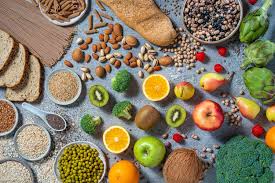Foods to Lower Blood Sugar: Daily Choices for Stable Health
Do you ever experience that mid-afternoon energy crash, a sudden brain fog, or find yourself constantly battling sugar cravings? For many, these seemingly minor annoyances are subtle whispers from their body, signaling an imbalance in blood sugar levels. It’s a common scenario: you eat a meal, feel good, then an hour or two later, you’re dragging, irritable, or reaching for another snack. This isn’t just about feeling tired; consistently high or fluctuating blood sugar can have profound, long-term impacts on your health, shaping everything from your mood to your risk of chronic disease.
But what if the solution wasn’t a strict, joyless diet, but rather an empowering shift in your daily food choices? Understanding how specific foods to lower blood sugar can transform your health is a game-changer. This guide isn’t about deprivation; it’s about abundance – discovering delicious, nutritious foods that work with your body to maintain stable glucose levels, boost energy, and protect your well-being for years to come.
Understanding Blood Sugar Dynamics: Why It Matters So Much
Our bodies are remarkably complex, and blood sugar (glucose) is the primary fuel source for our cells. After we eat, carbohydrates are broken down into glucose, which enters the bloodstream. In response, the pancreas releases insulin, a hormone that helps transport glucose from the blood into cells for energy or storage. This delicate dance ensures our cells get the fuel they need while keeping blood glucose within a healthy range.
The Problem: When the System Goes Awry
The problem arises when this system is constantly challenged, often by diets high in refined carbohydrates and sugars. Frequent spikes in blood sugar force the pancreas to work overtime, pumping out more and more insulin. Over time, cells can become less responsive to insulin’s signals – a condition known as insulin resistance. This leads to higher blood sugar levels, prompting even more insulin release, creating a vicious cycle.
The consequences of uncontrolled blood sugar are far-reaching and deeply concerning:
- Prediabetes & Type 2 Diabetes: Insulin resistance is the precursor to prediabetes and eventually Type 2 Diabetes, a chronic condition affecting millions globally. The Centers for Disease Control and Prevention (CDC) estimates that over 1 in 3 American adults have prediabetes, and 80% don’t even know it. Source: CDC, Prediabetes: Your Chance to Prevent Type 2 Diabetes.
- Cardiovascular Disease: Chronic high blood sugar damages blood vessels and nerves that control the heart, significantly increasing the risk of heart attack, stroke, and other cardiovascular problems.
- Kidney Damage (Nephropathy): High glucose levels can strain and damage the kidneys’ filtering units, potentially leading to kidney failure.
- Nerve Damage (Neuropathy): Nerves can be damaged throughout the body, causing tingling, numbness, pain, or weakness, especially in the hands and feet.
- Eye Damage (Retinopathy): High blood sugar can damage the blood vessels in the retina, leading to vision loss and even blindness.
- Energy & Mood Fluctuations: Beyond physical damage, daily high and low swings can cause fatigue, irritability, difficulty concentrating, and impact overall quality of life.
As Dr. Sarah Jenkins, a clinical endocrinologist at Mount Sinai Hospital, emphasizes, “Many patients overlook the profound daily impact of unstable blood sugar on their well-being, not just the long-term risks. It affects everything from cognitive function to emotional resilience. Dietary interventions are often the first and most powerful line of defense.”
The Power of Plate: Top Foods to Lower Blood Sugar Naturally
The good news is that you hold significant power to influence your blood sugar through your dietary choices. By incorporating specific nutrient-dense foods, you can stabilize glucose levels, improve insulin sensitivity, and mitigate many of the risks associated with dysregulation.
Fiber-Rich Champions: Slowing Absorption, Boosting Satiety
Fiber, especially soluble fiber, is a superstar for blood sugar control. It forms a gel-like substance in the digestive tract, slowing down glucose absorption into the bloodstream. This prevents rapid spikes and helps maintain steady levels.
Foods to add daily:
- Leafy Green Vegetables: Spinach, kale, collard greens. They are incredibly low in calories and carbohydrates but packed with fiber, vitamins, and minerals. A 2021 review in the journal *Nutrients* highlighted the benefits of vegetable intake in reducing the risk of type 2 diabetes. Source: Nutrients, 2021, “Dietary Patterns and Type 2 Diabetes Risk: A Review of Recent Evidence”.
- Berries: Blueberries, strawberries, raspberries. High in fiber and antioxidants, they provide natural sweetness without the dramatic blood sugar impact of other fruits.
- Legumes: Lentils, chickpeas, black beans. These are powerhouses of soluble fiber and plant-based protein, making them excellent for satiety and glucose control.
- Whole Grains: Oats, quinoa, barley, brown rice. Unlike refined grains, their fiber content helps slow sugar release. Opt for steel-cut oats over instant, and whole grain bread over white.
- Chia Seeds & Flaxseeds: Tiny but mighty, these seeds are loaded with soluble fiber and omega-3 fatty acids. They swell in liquid, helping you feel full and moderating glucose absorption.
Lean Proteins: Building Blocks for Stable Energy
Protein has a minimal impact on blood sugar levels directly and helps slow the digestion of carbohydrates eaten alongside it, leading to a more gradual rise in glucose. It also promotes satiety, reducing the likelihood of overeating.
Foods to add daily:
- Fish (especially Fatty Fish): Salmon, mackerel, sardines. Rich in omega-3 fatty acids, which can reduce inflammation and improve insulin sensitivity. Aim for 2-3 servings per week.
- Skinless Poultry: Chicken breast, turkey. Lean sources of protein that are versatile and can be incorporated into many meals.
- Eggs: An excellent source of protein, helping to keep you full and stabilize blood sugar.
- Greek Yogurt (Unsweetened): High in protein and often contains probiotics beneficial for gut health, which can indirectly influence metabolism.
- Tofu & Tempeh: Plant-based protein options that are also low in carbohydrates.
Healthy Fats: Enhancing Satiety and Insulin Sensitivity
While not directly lowering blood sugar, healthy fats play a crucial role by slowing digestion, increasing satiety, and potentially improving insulin sensitivity over time.
Foods to add daily:
- Avocado: Rich in monounsaturated fats and fiber, avocado helps keep you full and doesn’t spike blood sugar.
- Nuts: Almonds, walnuts, pistachios. These offer a good blend of healthy fats, fiber, and protein. A handful makes a great snack.
- Olive Oil (Extra Virgin): A staple of the Mediterranean diet, known for its anti-inflammatory properties and benefits for heart health and insulin sensitivity.
Herbs & Spices: Flavorful Allies in Glycemic Control
Certain herbs and spices have demonstrated properties that can aid in blood sugar management.
Consider incorporating:
- Cinnamon: Some studies suggest cinnamon can improve insulin sensitivity and lower blood glucose levels, particularly after meals.
- Fenugreek: This herb has been used traditionally to help lower blood sugar due to its fiber content and other compounds.
- Turmeric: Its active compound, curcumin, has anti-inflammatory effects and may play a role in improving insulin resistance. A 2019 study published in the *Journal of Clinical Endocrinology & Metabolism* explored curcumin’s potential in diabetes management. Source: Journal of Clinical Endocrinology & Metabolism, 2019, “Curcumin: A Potential Candidate for Diabetes Mellitus”.
Beyond the Plate: Lifestyle Habits for Stable Blood Sugar
While food choices are paramount, managing blood sugar is a holistic endeavor. Integrating these lifestyle practices can amplify the benefits of your dietary changes.
- Stay Hydrated: Drinking enough water helps your kidneys flush out excess sugar through urine. Aim for 8-10 glasses daily.
- Regular Physical Activity: Exercise helps muscles use glucose for energy and improves insulin sensitivity. Even short walks after meals can make a difference.
- Prioritize Sleep: Poor sleep can increase insulin resistance and elevate stress hormones, leading to higher blood sugar levels. Target 7-9 hours of quality sleep per night.
- Manage Stress: Stress hormones like cortisol can raise blood glucose. Practice mindfulness, meditation, yoga, or spend time in nature to reduce stress.
- Mindful Eating: Pay attention to hunger and fullness cues, eat slowly, and savor your meals. This can prevent overeating and improve digestion.
Case Study: Maria’s Journey to Stable Energy
Maria, a 48-year-old marketing professional, felt constantly drained. She relied on sugary snacks to power through her day, only to crash harder an hour later. Her doctor flagged her prediabetic A1C levels. Distressed, Maria decided to overhaul her diet. She started by replacing her sugary breakfast cereal with steel-cut oats topped with berries and chia seeds. Lunch became a vibrant salad with chickpeas, grilled chicken, and avocado, replacing her usual white-bread sandwich. For snacks, she swapped cookies for a handful of almonds or Greek yogurt. Within three months, Maria noticed a dramatic improvement in her energy levels, no more afternoon slumps, and she even lost 10 pounds. Her follow-up A1C test showed a significant reduction, pulling her out of the prediabetic range. Maria credits the focus on specific foods to lower blood sugar and consistent hydration as her key strategies.
Common Misconceptions About Blood Sugar and Diet
Navigating dietary advice can be confusing. Let’s debunk a few common myths that might hinder your progress:
- Myth 1: All Carbs Are Bad. False. The type and quantity of carbohydrates matter most. Complex carbs from whole grains, legumes, and vegetables are digested slowly and provide sustained energy. Refined carbs (white bread, sugary drinks) cause rapid spikes.
- Myth 2: Fruit Is Too Sugary for Diabetics. While fruit contains natural sugars, it also provides fiber, vitamins, and antioxidants. The fiber helps mitigate the sugar’s impact. Portion control and choosing lower-glycemic fruits (like berries, apples, pears) are key.
- Myth 3: Artificial Sweeteners Are Always a Safe Bet. Emerging research suggests some artificial sweeteners may negatively impact gut microbiota and potentially affect glucose metabolism, possibly even contributing to insulin resistance in some individuals. Water is always the best choice for hydration.
- Myth 4: Skipping Meals Helps Lower Blood Sugar. Skipping meals can lead to overeating later and can cause significant blood sugar fluctuations, often resulting in lower-than-normal levels followed by sharp spikes. Consistent, balanced meals are generally more effective.
Your Path to Sustainable Blood Sugar Balance
Taking control of your blood sugar doesn’t require drastic, unsustainable changes. It’s about making informed, conscious choices that honor your body’s needs. By intentionally incorporating the right foods to lower blood sugar into your daily routine, you’re not just preventing disease; you’re investing in a future filled with vibrant energy, mental clarity, and profound well-being. Each meal is an opportunity to nourish your body and stabilize your glucose, building a foundation for lasting health. Embrace these powerful dietary strategies, listen to your body, and take the first step towards a healthier, more balanced you. Consult with a healthcare professional or registered dietitian for personalized dietary advice tailored to your specific health needs.
Author Bio:
Dr. Elara Vance is a board-certified nutritionist and health educator with over 15 years of experience in clinical practice and public health initiatives. Holding a Ph.D. in Nutritional Sciences from the University of London and a Registered Dietitian (RD) credential, Dr. Vance specializes in metabolic health, diabetes prevention, and sustainable dietary interventions. Her work focuses on translating complex scientific research into actionable, human-centered strategies, empowering individuals to achieve optimal health through evidence-based nutrition.





